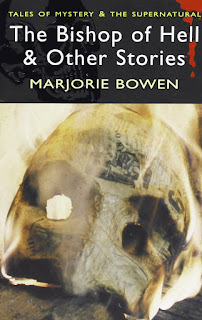Marjorie Bowen (1885-1952, real name: Gabrielle Margaret Vere Long) is someone who has fascinated me for a long time. She was a writer by necessity, supporting her increasingly ungrateful and demanding family (although her children adored her; her youngest son, who wrote the charming introduction, speaks of her was a wonderful, loving mother). She wrote under numerous pen names....historical novels as George Preedy, crime novels as Joseph Shearing (really romans-a-clef, based on notorious real crimes), assorted novels and stories as Margaret Campbell, John Winch, and Robert Paye, but she's best remembered for her supernatural tales written under the Bowen moniker.
But even with all that, which would lead one to assume she was a hack....she was a damned good storyteller, often quite daring, and with undeniable grace as a stylist. She made good money writing, so she was capable of grasping the public imagination. She is slowly being rediscovered by the literati for her style and grace. And she could be transgressive...her first novel, The Viper of Milan, had trouble finding a publisher as it was deemed too violent, especially for something written by a young lady. (She was only in her teens when she wrote it.) But later works could delve into taboo subjects...Black Magic, for instance, deals with a sorcerer who engineers to be elected Pope, and although never explicitly stated, it's pretty clear the character is a woman passing as a man (and is a version of the Pope Joan legend), with homosexuality and trans issues lurking in the wings at every turn.
This collection in particular, one of Wordsworth's excellent series of supernatural reprints, is a superb sampler of Bowen's work. To run down...
Some tales are contemporary. "The Fair Hair of Ambrosine," set in France, is a tale of love, murder, and destiny via a prophetic dream. "The Crown Derby Plate," one of Bowen's more popular works, is a simple ghost story given a twist by the fact that the manifestation of the ghost hints that the original person may have been a cross-dresser or trans.
A group of tales are set in the Regency, which I think is an overlooked time for supernatural fiction. "The Housekeeper" deals with a dissolute Regency beau who finds himself benevolently haunted by a seemingly forgiving shade of someone he once deeply wronged. "Florence Flannery" is a strange tale, dealing with a possible case of reincarnation, and revenge committed by a watery specter.
"Elsie's Lonely Afternoon" is an interesting tale with some trappings of the supernatural but really a tale of crime. It deals with a young girl who's browbeaten and convinced she's an unwanted nuisance by all around her, and how she falls victim to a crime by dint of her own trusting nature and innocence. The depiction of an innocent who is beaten down and taken advantage of by a grasping family sounds a lot like Bowen's own home life; I wonder if it was deliberate.
"The Bishop of Hell" is another Regency tale, this time a rather straightforward tale of a bad man who dies, but returns to give a warning of sorts....but he seems to relish his punishment. "The Grey Chamber" purports to be an anonymous French tale that Bowen translated, but I think it's an original work. And it's a great sort of penny-dreadful tale of a night spent in a haunted chamber; rather standard in its plot, but well done for what it is. "The Extraordinary Adventure of Mr. John Proudie" is another penny-dreadful sort of story, but again, well done. In it, a good doctor is called on to give aid under mysterious circumstances, but finds himself caught in a web of intrigue. It's not very supernatural but full of thrills and weird atmosphere.
"The Scoured Silk" is a nasty conte cruel of a man's brutal treatment of his wife, and Bowen might have been making a feminist comment with it. In other works, she did express sympathy for women caught in bad marriages and mistreated by the men in their lives, so I can't help but wonder. "The Avenging of Ann Leete," a tale set in Georgian times, is a tale of murder and a unique sort of justice, involving a sort of confession by astral projection!
"Kecksies," another Regency tale, is also notably famous. It's full of dire, macabre atmosphere, but also gives us spectral revenge in the form of what is clearly indicated to be a ghostly rape and murder. This is sharp stuff for the time! The collection concludes with "Ann Mellor's Lover," a tale of a clairvoyant antique dealer putting together the clues to solve a decades-old murder. It's not a bad tale, and I wonder if it was meant to become a series. Bowen writing a supernatural detective would have been wonderful.
This is a great collection of eerie tales by a neglected master. Look for Bowen's works when you browse the used book racks, or try your local library system. Anything by her is worth checking out, and I hope more of her work is reprinted or at least made available as ebooks.
Subscribe to:
Post Comments (Atom)





1 comment:
Hiya; I got this one on your recommendation, and have been enjoying it. Thanks for the recommendation!
One other thing I'll mention--in Florence Flannery, perhaps rather than reincarnation, the characters of that name are actually one and the same--cursed to live on and wander the earth until revenge can be finally be exacted. But either interpretation works.
I also wanted to say thanks for the fact that your blog has led me to the books of Bellairs (and Strickland), which have now become a favorite of my son.
Post a Comment